News
-
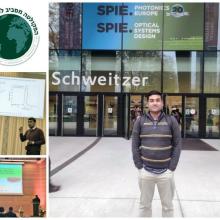
Greetings from Strasbourg
Post-doctoral fellow Sukanta Nandi of Dr. Tomer Lewi’s lab attended the SPIE conference in Strasbourg, France. His research explores the optical properties of quantum and two-dimensional materials
-
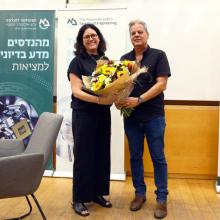
Change of Dean Ceremony
Prof. Ze’ev Zalevsky stepped down from his role and welcomed Prof. Orit Shefi to assume the role of dean of the Faculty of Engineering. The ceremony was attended by faculty members and staff, Vice President of Research, and Bar-Ilan University’s Rector who welcomed Shefi: “These are big shoes to fill, and we are certain that you can rise to the challenge.”
-
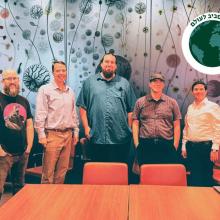
Greetings from California
Doctoral student Ariel Ashkenazy traveled to Chapman University in California, to conduct joint research with Prof. John Howell, funded by a BSF grant. While at Chapman, his research focused on exploring the properties of superoscillating signals and their relationship to temporal and spatial super-resolution.
-
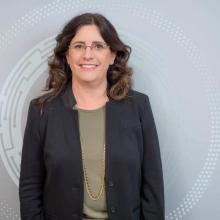
“I am driven by the Faculty’s success”
Entering her new role as Dean of the Faculty of Engineering, Prof. Orit Shefi is full of passion and plans to promote research, industry collaborations, and community involvement
-

Tips for a Successful Academic Year
In celebration of the new academic year’s opening, we reached out to our faculty members and asked them: What advice would you like to give to students embarking on their academic journey??
-
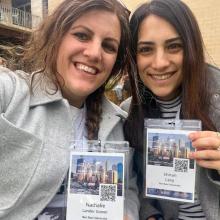
Postcard from Perth
PhD students Shiran Levy and Nathalie Lander Gower of Dr. Asaf Albo’s research group flew all the way to Australia to present their research on implementations of Terahertz quantum cascade laser
-
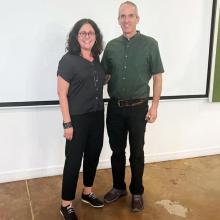
Bioengineering Track Day
A scientific breakthrough in the cultured meat industry, fast and sensitive detection of the ricin toxin, and curing cancer with gold nanoparticles – these are just a few of the fascinating topics discussed in the Bioengineering Track Day
-

This Is How a Real Hi-tech Company Works
Instead of test, students at the Systems and Signal Processing course were divided into five groups and established fictive hi-tech companies that manufacture and sell audio signal processing products. The response, says Dr. Ofer Schwartz, was highly enthusiastic
-
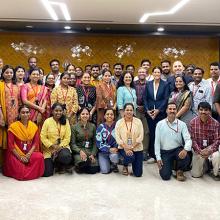
Learning How to Teach Chip Design
Prof. Adam Teman taught a course on chip design to faculty members from faculties of engineering across India. The initiative was a resounding success and is expected to produce fascinating collaborations
-
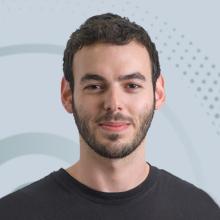
Dr. Dor Atzmon Wins Prestigious MOST Research Grant
The research, aimed at detecting and preventing moving robot collisions, is a collaboration between Atzmon and researchers from Ben-Gurion University and Charles University in Prague
-
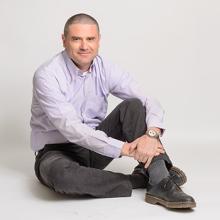
“We’ve accomplished some great things here”
Prof. Ze’ev Zalevsky concludes a five-year term as Dean of the Faculty, a period that included COVID-19, an academic strike, and a war. Despite the struggles, he looks back at his achievements with satisfaction, and is already looking forward to his next role as Vice President of the University for Academia-Industry Relations
-
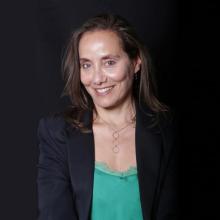
Meet Dr. Hila Chalutz-Ben Gal
Dr. Chalutz-Ben Gal joined the Industrial Engineering and Information Systems Program. She specializes in People Analytics, data-driven tools to analyze and improve decision-making related to human resources
-
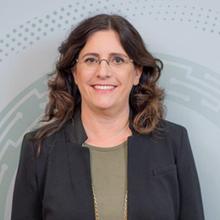
Prof. Orit Shefi won the United States-Israel Binational Science Foundation BSF grant
Prof. Orit Shefi won the United States-Israel Binational Science Foundation BSF grant, in collaboration with Prof. Xiangfan Chen of the Arizona State University. Their joint research is focusing on the development of interfaces to the nervous system that will enable remote stimulation of neural cells by usage of magnetic fields. With these devices they will be able to stimulate neurons remotely. The research involves creation of new smart material types and implantable components.
-
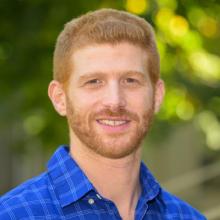
Congratulations to Dr. Amir Weiss
Congratulations to Dr. Amir Weiss. Dr. Weiss is one of two winners from Bar-Ilan University. The Fellowship is awarded to outstanding students and allows universities to employ them full-time. Dr. Weiss, who specializes in signal processing, has joined the faculty as a senior lecturer in the Electrical Engineering program.
-
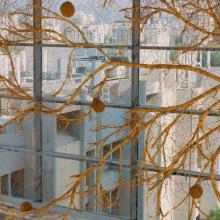
Prof. Orit Shefi presents at TRANSMEET Art and Science Festival
The second TRANSMEET Science and Art Festival will be held on September 19–21. Prof. Shefi will be presenting “Stretching the Limits,” a collaborative piece with artist Vardi Bobrow, based on Shefi’s research of the nervous system on a single-cell level, an developing nervous rehabilitation systems.
For more information and tickets



